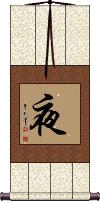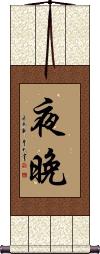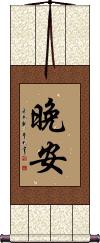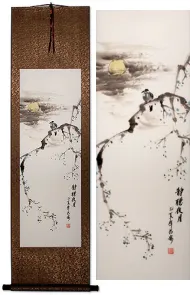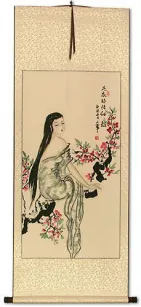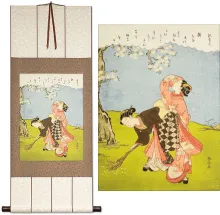Many custom options...
And formats...

Night Evening in Chinese / Japanese...
Buy a Night Evening calligraphy wall scroll here!
Personalize your custom “Night Evening” project by clicking the button next to your favorite “Night Evening” title below...
Night / Evening
As simple as that, 夜 is the character that means evening or night in Chinese, Korean and Japanese.
Sometimes can mean “in the dark.”
Night
Good Night
This in-stock artwork might be what you are looking for, and ships right away...
Gallery Price: $90.00
Your Price: $49.88
Gallery Price: $126.00
Your Price: $69.88
Gallery Price: $200.00
Your Price: $88.88
Gallery Price: $115.00
Your Price: $63.88
Gallery Price: $60.00
Your Price: $39.88
Gallery Price: $61.00
Your Price: $33.88
Not the results for Night Evening that you were looking for?
Below are some entries from our dictionary that may match your Night Evening search...
| Characters If shown, 2nd row is Simp. Chinese |
Pronunciation Romanization |
Simple Dictionary Definition |
夜 see styles |
yè ye4 yeh yoru よる |
More info & calligraphy: Night / Evening(n,adv) (1) night; evening; (2) (よる only) dinner; (female given name) Yoru Night; translit ya. |
晚安 see styles |
wǎn ān wan3 an1 wan an |
More info & calligraphy: Good Night |
夕 see styles |
xī xi1 hsi yuube / yube ゆうべ |
(bound form) sunset; dusk; (bound form) evening; night; Taiwan pr. [xi4] (n,adv) evening; (female given name) Yūbe Evening. |
宵 see styles |
xiāo xiao1 hsiao yoi よい |
night evening; early night hours; (surname, female given name) Yoi |
晚 see styles |
wǎn wan3 wan ban |
evening; night; late twilight |
晩 see styles |
wǎn wan3 wan ban ばん |
variant of 晚[wan3] (n,adv) (1) evening; night; (2) (abbreviation) (See 晩飯・ばんめし) dinner; evening meal; (counter) (3) counter for nights; (surname) Ban Sunset, evening, twilight; late. |
汐 see styles |
xī xi1 hsi seki せき |
night tides; evening ebbtide; Taiwan pr. [xi4] (1) tide; current; (2) salt water; (3) opportunity; (surname) Seki |
一夜 see styles |
yī yè yi1 ye4 i yeh kazuyo かずよ |
(n,adv) one night; all night; overnight; one evening; (female given name) Kazuyo one night |
一宵 see styles |
isshou / issho いっしょう |
(archaism) one evening; one night |
一晩 see styles |
hitoban ひとばん |
(n-adv,n-t) (1) one night; one evening; (2) all night; overnight |
傍晚 see styles |
bàng wǎn bang4 wan3 pang wan |
in the evening; when night falls; towards evening; at night fall; at dusk |
六時 六时 see styles |
liù shí liu4 shi2 liu shih rokuji ろくじ |
(1) six o'clock; (2) (Buddhist term) six periods of a day (morning, midday, afternoon, evening, midnight, late night) The six 'hours' or periods in a day, three for night and three for day, i. e. morning noon, evening; night, midnight, and dawn. Also, the six divisions of the year, two each of spring, summer, and winter. |
冬夜 see styles |
dōng yè dong1 ye4 tung yeh touya / toya とうや |
(female given name) Touya The night before the 冬至 winter solstice. |
初夜 see styles |
chū yè chu1 ye4 ch`u yeh chu yeh shoya; soya しょや; そや |
early evening; wedding night; (fig.) first sexual encounter (1) bridal night; first night; (2) first watch of the night The first of the three divisions of the night. |
夕べ see styles |
yuube / yube ゆうべ |
(n-adv,n-t) (1) evening; (2) last night |
夜々 see styles |
yoyo よよ |
(n-adv,n-t) every evening; night after night |
夜分 see styles |
yè fēn ye4 fen1 yeh fen yabun やぶん |
(n,adv) evening; night; nighttime nighttime |
夜咄 see styles |
yobanashi よばなし |
(1) night chat; tale told at night; (2) evening tea party (starting around 6 pm) |
夜夜 see styles |
yè yè ye4 ye4 yeh yeh yoyo よよ |
every night (n-adv,n-t) every evening; night after night |
夜学 see styles |
yagaku やがく |
(1) night school; evening school; evening class; (2) night study |
夜校 see styles |
yè xiào ye4 xiao4 yeh hsiao |
evening school; night school |
夜気 see styles |
yaki やき |
night air; stillness of night; cool evening |
夜話 see styles |
yobanashi よばなし yawa やわ |
(1) night chat; tale told at night; (2) evening tea party (starting around 6 pm); (1) night chat; tale told at night; (n,n-suf) (2) book of informal essays |
夜間 夜间 see styles |
yè jiān ye4 jian1 yeh chien yakan やかん |
nighttime; evening or night (e.g. classes) (n,adv) night; nighttime |
夜陰 see styles |
yain やいん |
(See 夜陰に乗じて) shades of evening; dead of night |
夜露 see styles |
yotsuyu; yaro よつゆ; やろ |
evening dew; night dew |
大夜 see styles |
dà yè da4 ye4 ta yeh daiya |
the second half of the night; early morning (cf. 小夜[xiao3 ye4], evening); (fig.) eternal rest; death; (Buddhism) the night before the cremation of a monk The great night, i.e. that before the funeral pyre of a monk is lighted; also 迨夜; 宿夜. |
宵月 see styles |
yoizuki よいづき |
(See 夕月) evening moon; moon that can only be seen in the early hours of the night (esp. from the 2nd to the 7th of the eight month) |
小夜 see styles |
xiǎo yè xiao3 ye4 hsiao yeh serenaade / serenade せれなーで |
the first half of the night; evening (cf. 大夜[da4 ye4], early morning) evening; (female given name) Serena-de |
後夜 后夜 see styles |
hòu yè hou4 ye4 hou yeh goya ごや |
(1) period from midnight until the early morning; (2) (See 寅の刻) around 4am The third division of the night. |
Click here for more Night Evening results from our dictionary
The following table may be helpful for those studying Chinese or Japanese...
| Title | Characters | Romaji (Romanized Japanese) | Various forms of Romanized Chinese | |
| Night Evening | 夜 | yoru | yè / ye4 / ye | yeh |
| Night | 夜晚 | yè wǎn / ye4 wan3 / ye wan / yewan | yeh wan / yehwan | |
| Good Night | 晚安 | wǎn ān / wan3 an1 / wan an / wanan | ||
Successful Chinese Character and Japanese Kanji calligraphy searches within the last few hours...
